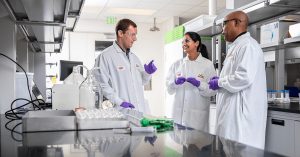Eli Lilly said today it has launched a $700M Institute for Genetic Medicine in Boston’s Fort Point section as part of its strategy to advance RNA- and other nucleic acid-based therapeutics.
Researchers at the Institute will work with colleagues in New York City to apply RNA and DNA-based technologies toward developing therapies deemed to hold the potential to treat or prevent diseases in ways that are either challenging or not possible with traditional medicines.
“Lilly will focus on medicines acting at the nucleic acid level to advance an entirely new class that target the root cause of diseases, an approach that is fundamentally different than medicines available today,” Andrew C. Adams, vice president of genetic medicine at Lilly and co-director of the Institute, said in a statement. “Establishing the Lilly Institute for Genetic Medicine will allow us to pair cutting-edge technologies with our deep biological expertise in several areas including neuroscience and diabetes.”
Genetic medicines now account for more than 20 percent of Lilly’s diabetes, immunology, and central nervous system research portfolio—a percentage the company aims to increase through the Institute.
The new Institute will be based within the 334,000-square-foot 15 Necco Street, a 12-story building Lilly plans to lease from publicly-traded life sciences developer-owner Alexandria Real Estate Equities. The building, which began construction last year, was originally envisioned as a headquarters for General Electric, until the company announced plans in November to split into three publicly- traded companies.
15 Necco, developed by Alexandria in partnership with National Development, will feature open space along Boston’s Harborwalk as well as public space on the building’s ground floor, which will include a flexible community “touchdown” space for co-working, retail spaces, “healthy” eateries, and a public work lounge connecting pedestrians and visitors to waterfront public art, walking paths, a public dock, and programmed outdoor spaces
“15 Necco, designed to be a unique and inspiring facility, represents a critical piece of our remarkable value-creation pipeline, and we are thrilled to bring an anchor tenant to this unparalleled location in the Seaport, where we are pioneering a new life science submarket,” stated Peter M. Moglia, co-CEO and co-chief investment officer of Alexandria Real Estate Equities, in a statement issued by the real estate investment trust.
2024 occupancy planned
Lilly said it plans to occupy the Institute site in Boston in 2024, soon after the “late 2023” projected completion timeframe announced by Alexandria.
In anticipation of that move, Lilly has leased 36,000 square feet at nearby 215 First Street, also owned and operated by Alexandria, to support the scale-up of the new Institute before moving into 15 Necco.
15 Necco will include a shared space designed to support Boston-area biotech startups with dedicated and configurable lab and office space, access to Lilly researchers, and opportunities for collaboration.

Within five years, Lilly has projected, the Institute site in Boston will more than double in staff from 120 to 250-plus research biologists, chemists, data scientists, and other experts in genetic medicine.
The company plans to base another up to 200 scientists in New York City, where Lilly-owned Prevail Therapeutics is based. Lilly acquired Prevail in 2020 for up to $1.04 billion, in a deal that established the pharma giant’s gene therapy program, which is anchored by Prevail’s portfolio of neuroscience programs.
“The Institute will enhance our efforts on neurodegenerative diseases and integrate Lilly’s genetic medicine research and platforms with the goal of advancing promising and potentially life-altering new medicines from the lab to clinical studies and ultimately to patients,” stated Franz Hefti, the Institute’s other co-director and the CEO of Prevail Therapeutics at Lilly.





